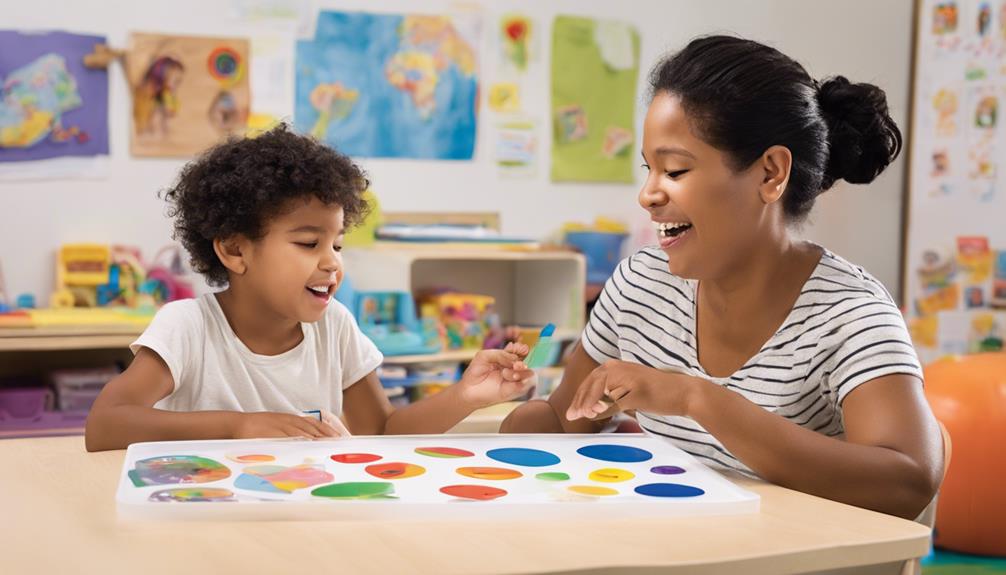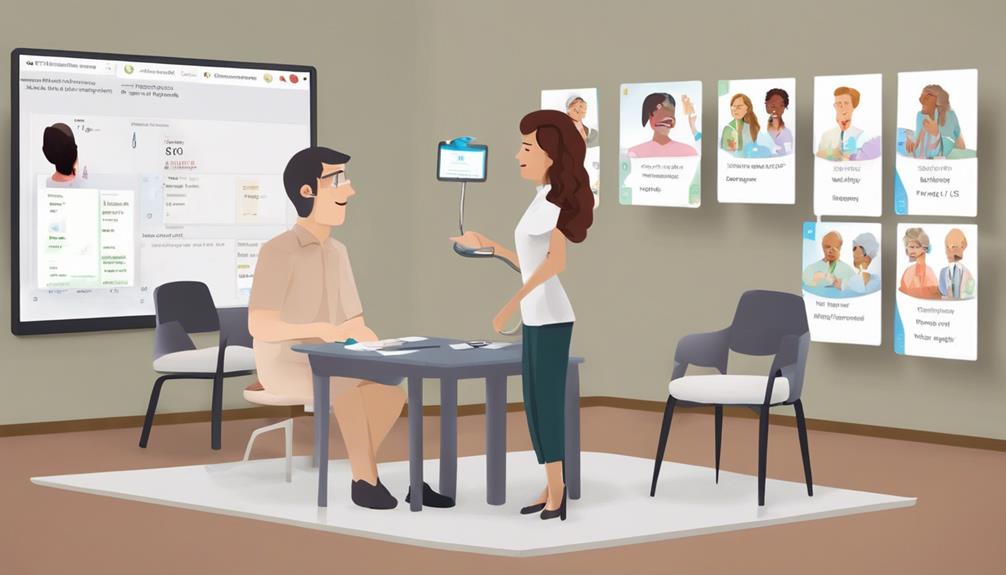Let’s focus on improving our listening skills through speech therapy activities to enhance auditory processing.
Exploring the world of sound through engaging exercises can unlock a child's potential in ways that resonate beyond words.
From deciphering animal calls to locating sounds in space, these activities hold the key to a transformative journey.
By immersing in these dynamic auditory adventures, one can witness a world where listening becomes an art form, paving the way for a richer auditory experience.
Key Takeaways
- Speech therapy exercises improve auditory discrimination and memory in individuals with APD.
- Interactive listening activities enhance auditory function and processing skills effectively.
- Language development games target auditory skills and make learning enjoyable for children with APD.
- Sound discrimination techniques in therapy sharpen auditory processing abilities and aid in speech clarity.
Speech Therapy Exercises for Auditory Processing
Speech therapy exercises for auditory processing aim to enhance listening, understanding, and processing of spoken language, targeting key skills such as auditory discrimination, memory, sequencing, and integration. These activities play a crucial role in developing auditory processing skills, including auditory memory.
By engaging children in interactive listening games, speech therapists can effectively help children with auditory processing disorder (APD) improve their ability to remember and recall auditory information. Through structured tasks like sound matching, sound blending, and sound discrimination games, children with auditory processing difficulties can enhance their auditory memory capacity.
These exercises are designed to be enjoyable and engaging while also being effective in strengthening the neural pathways responsible for processing auditory information. By incorporating these listening games into therapy sessions, speech therapists can make significant strides in assisting children with APD to overcome challenges related to auditory memory and ultimately improve their overall communication skills.
Interactive Listening Activities for APD
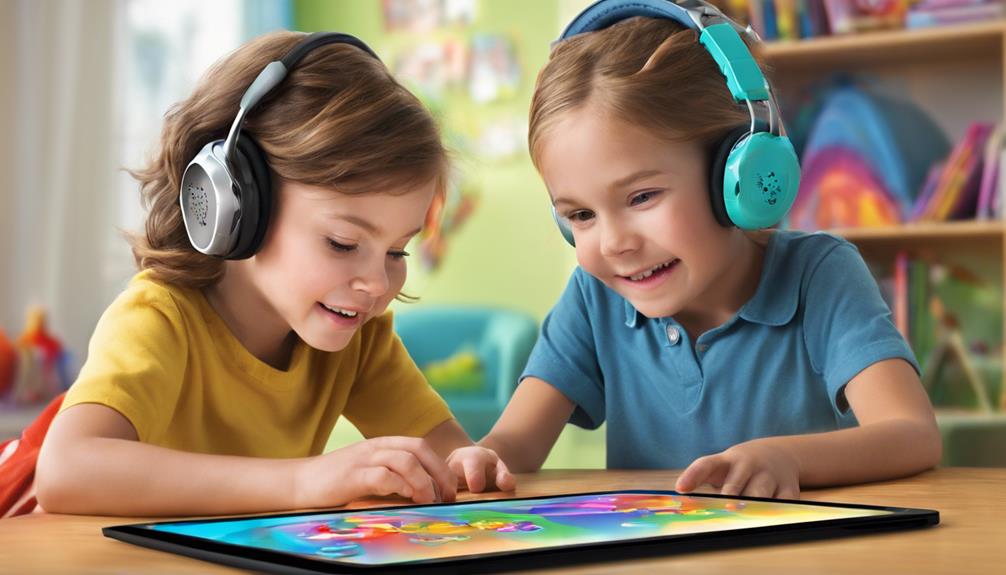
To further enhance auditory processing skills in children with auditory processing disorder (APD), engaging in interactive listening activities can significantly improve their ability to discriminate between different sounds and tones. These auditory processing activities are specifically designed to target listening skills and help improve auditory function in children with APD.
By participating in games like sound localization, animal sounds identification, and environmental sound guessing, children can practice distinguishing between various sounds and tones, ultimately enhancing their auditory processing abilities. Additionally, activities involving musical instruments, such as copycat games, can assist in developing both listening and playing skills simultaneously.
Intensity sounds games and blindfold sound localization games are also effective in improving auditory processing by challenging children to focus on specific sounds and tones. Incorporating these interactive listening activities into your child's routine can play a crucial role in helping your child with APD improve their auditory processing skills and overall listening abilities.
Language Development Games for Auditory Skills
Engaging in language-based interactive games can effectively enhance auditory skills in children with Auditory Processing Disorder (APD). Language development games play a crucial role in improving auditory skills in children with APD. These activities focus on enhancing auditory processing through fun and engaging methods. Here is a table showcasing some language development games that can benefit children with APD:
| Game | Description | Benefits |
|---|---|---|
| Copy Cat | Use musical instruments to teach listening and playing skills | Enhances auditory processing and imitation skills |
| Animal Sounds Game | Engages children in auditory processing and sound recognition | Improves auditory discrimination and memory |
| Sound Localization Activities | Blindfold games to help children identify the direction of sounds | Enhances auditory localization and spatial skills |
These games offer a dynamic way to enhance auditory skills in children with APD, making learning both effective and enjoyable.
Sound Discrimination Techniques in Therapy
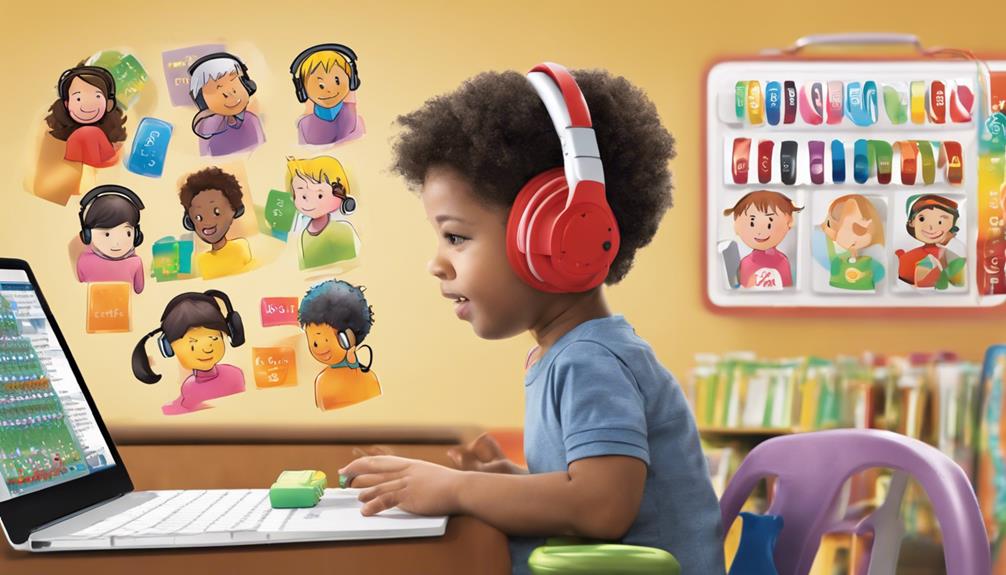
When it comes to sound discrimination techniques in therapy, understanding the importance of accurately distinguishing between similar sounds is key.
Utilizing tools specifically designed for sound discrimination can aid in sharpening auditory processing skills.
Sound Discrimination Importance
In therapy, developing sound discrimination skills is crucial for individuals to distinguish between similar sounds in speech, ultimately enhancing auditory processing abilities and speech clarity.
Sound discrimination techniques in therapy activities aim to improve communication skills, especially for individuals with auditory processing disorders. By focusing on identifying subtle differences in sounds like 'p,' 'b,' and 't,' therapy helps enhance listening abilities and speech articulation.
These activities are essential for individuals facing challenges in processing auditory information, as they provide targeted training to differentiate between specific phonemes. Through sound discrimination training, individuals can overcome obstacles in understanding spoken language, leading to improved communication and overall speech intelligibility.
Tools for Sound Discrimination
Utilizing sound discrimination tools in therapy activities enhances individuals' abilities to distinguish between various sounds accurately, improving auditory processing skills and speech clarity.
These tools play a crucial role in addressing auditory processing disorders by honing auditory skills through engaging games and activities.
Speech therapists employ a variety of techniques such as sound discrimination games, auditory training exercises, and sound sequencing tasks to help individuals develop a heightened awareness of subtle sound variations.
By participating in these targeted activities, individuals with auditory processing disorders can strengthen their listening skills and comprehension abilities.
Sound discrimination therapy serves as a valuable tool for individuals looking to enhance their capacity to interpret and respond to different auditory stimuli effectively, ultimately leading to improved overall auditory processing abilities.
Practice and Improvement
Sound discrimination techniques are essential in speech therapy because they train individuals to accurately identify and differentiate various sounds, improving auditory processing skills and communication abilities. These techniques help children distinguish between similar sounds like 's' and 'sh,' enhancing listening skills. Engaging in sound discrimination activities can benefit children with auditory processing disorder by improving their ability to process auditory information effectively.
Therapists use specific exercises to help children recognize subtle differences in speech sounds, words, and tones, which ultimately aids in their language processing abilities. Consistent practice and guidance in speech therapy activities focused on sound discrimination can significantly help children strengthen their auditory skills and enhance their overall communication capabilities.
Enhancing Phonemic Awareness Through Activities
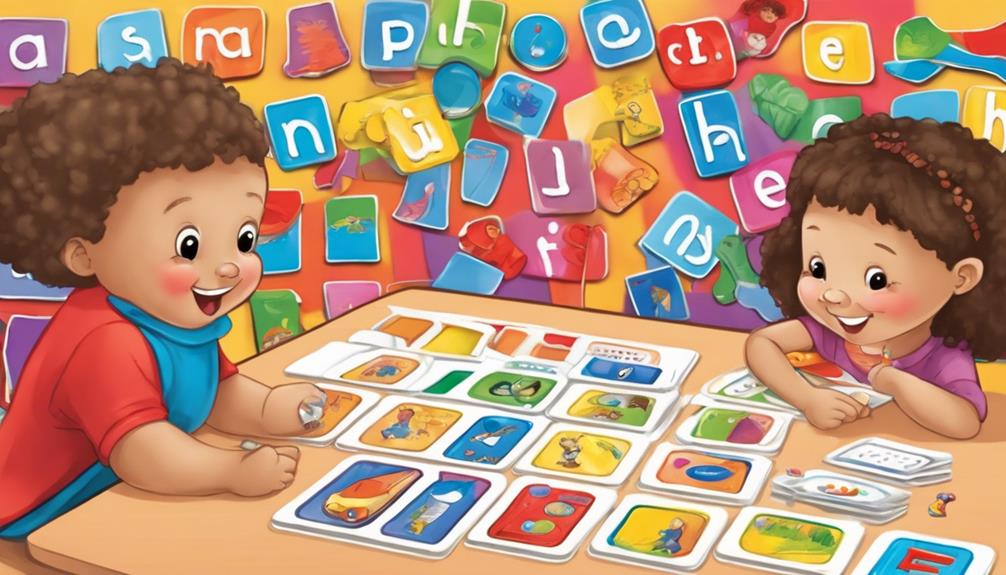
Enhancing phonemic awareness through engaging activities is a foundational step towards developing strong reading and language skills in children. Phonemic awareness, the ability to hear, identify, and manipulate individual sounds in words, is crucial for literacy development. Children with Auditory Processing difficulties can benefit significantly from activities that target phonemic awareness.
Here are three effective activities to enhance phonemic awareness:
- Rhyming Games: Encourage children to identify words that rhyme and create their own rhymes. This activity helps them focus on the sounds at the end of words.
- Sound Blending Exercises: Have children blend individual sounds together to form words. This activity improves their ability to combine sounds fluidly.
- Segmenting Words: Ask children to break words into individual sounds. This activity enhances their skills in isolating and recognizing separate sounds within words.
Engaging in these activities not only strengthens phonemic awareness but also contributes to improved reading, spelling, and overall language skills in children.
Improving Auditory Attention and Focus

In speech therapy activities aimed at improving auditory attention and focus, we focus on active listening strategies and engaging auditory exercises.
These techniques are designed to help individuals enhance their ability to concentrate on and process auditory information effectively.
Active Listening Strategies
Active listening strategies play a crucial role in speech therapy by enhancing auditory attention and focus in children with auditory processing difficulties. To help improve auditory sensory processing, we implement the following strategies:
- Minimize Background Noise: Reduce distractions during therapy sessions to facilitate better focus on auditory stimuli.
- Use Visual Cues: Pair auditory information with visual cues and gestures to reinforce comprehension and engagement.
- Structured Activities: Provide clear goals and expectations in listening tasks to promote sustained attention and concentration.
Engaging Auditory Exercises
Engaging auditory exercises play a vital role in improving auditory attention and focus in children with auditory processing difficulties. These activities, such as Simon Says, Red Light Green Light, and Freeze Dance, help enhance auditory processing skills by requiring children to follow auditory instructions, thereby improving their listening skills and attention span. By engaging in interactive games that involve auditory stimuli, children can strengthen their ability to process and respond to what they hear. Speech therapy activities that focus on auditory engagement can be particularly beneficial for children facing challenges with auditory processing. Below is a table illustrating some engaging auditory exercises that can aid in improving auditory attention and focus:
| Auditory Exercises | Description | Benefits |
|---|---|---|
| Simon Says | Follow instructions given verbally | Enhances listening skills and attention span |
| Red Light Green Light | Respond to auditory cues for movement | Improves response time and auditory processing skills |
| Freeze Dance | Stop and start dancing based on music cues | Builds auditory attention and the ability to follow auditory commands |
Practical Strategies for Auditory Processing

Utilizing sound discrimination games and listening exercises effectively enhances auditory processing skills in children with Auditory Processing Disorder (APD). To further enhance auditory processing through speech therapy activities, we've identified practical strategies that can be incorporated into therapy sessions:
- Sound Discrimination Games: Engage children in activities that require them to differentiate between similar sounds. This can include games like 'Sound Bingo' where they match sounds to corresponding pictures or 'Sound Scavenger Hunt' where they identify specific sounds in their environment.
- Listening Exercises: Implement listening tasks that challenge children to follow multi-step directions, discriminate between different tones or pitches, or identify sounds within words. Activities such as 'Simon Says' with auditory cues or 'Musical Chairs' with designated sound prompts can be beneficial.
- Use of Visual Aids and Hands-on Activities: Incorporate visual aids like sound cue cards or tactile materials to reinforce auditory information. Pairing auditory tasks with visual or kinesthetic components can help solidify auditory processing skills.
Frequently Asked Questions
Can Speech Therapy Help With Auditory Processing?
Yes, speech therapy can help with auditory processing. Therapists utilize targeted activities to enhance listening skills, improve comprehension, and boost communication abilities.
By focusing on auditory discrimination and processing, speech therapy contributes to language development and the ability to follow directions.
Customized therapy plans tailored to individual needs address specific auditory processing challenges, fostering progress in this crucial area.
What Are the Exercises for Auditory Processing?
Exercises for auditory processing include sound localization games and animal sounds identification to enhance listening skills. Engaging in nature-based activities like listening to natural sounds can boost auditory processing abilities.
Games such as Red Light/Green Light and Simon Says aid in auditory discrimination, memory, and following directions during therapy. Recognizing similarities and differences in sounds, words, and speech through auditory discrimination activities can also improve auditory processing skills.
How Do You Improve Auditory Processing?
Improving auditory processing involves engaging in various activities like:
- Sound localization games
- Musical rhythm exercises
- Phonemic awareness tasks
These activities help enhance directional hearing, discrimination skills, and sound identification abilities.
Nature-based auditory tasks and discrimination games can also boost attention, memory, and following directions.
How Do You Teach Auditory Processing?
To teach auditory processing, we focus on sound discrimination, localization, and recognition. Structured tasks targeting listening, comprehension, and sound identification are crucial. Effective strategies include visual aids, gestures, and multisensory techniques.
Tailoring activities to specific challenges can greatly improve communication and language skills. Providing repetitive auditory tasks is key to enhancing processing abilities. By customizing approaches and incorporating various sensory modalities, we can effectively support individuals in developing strong auditory processing skills.
Conclusion
In conclusion, engaging in speech therapy activities can significantly enhance auditory processing skills in children. By incorporating interactive games and exercises, children with auditory processing disorders can improve their language abilities, phonemic awareness, and attention to auditory stimuli.
These activities not only stimulate auditory discrimination but also promote overall auditory processing development.
So, let's tune into the power of speech therapy and listen to the sound of progress!


